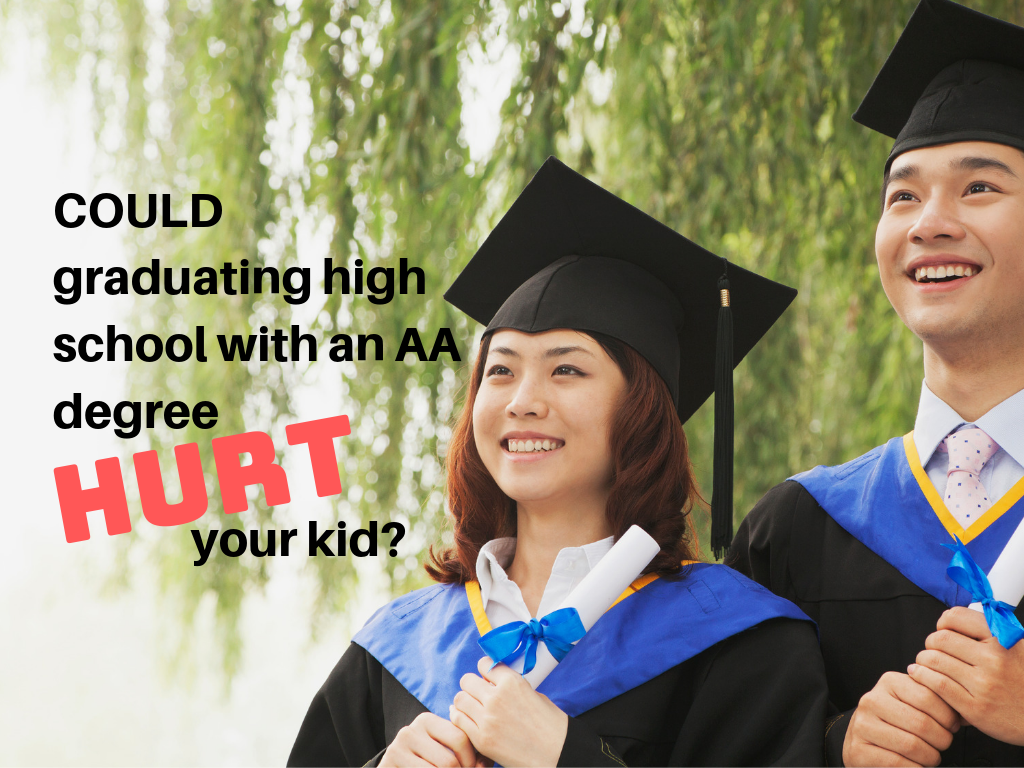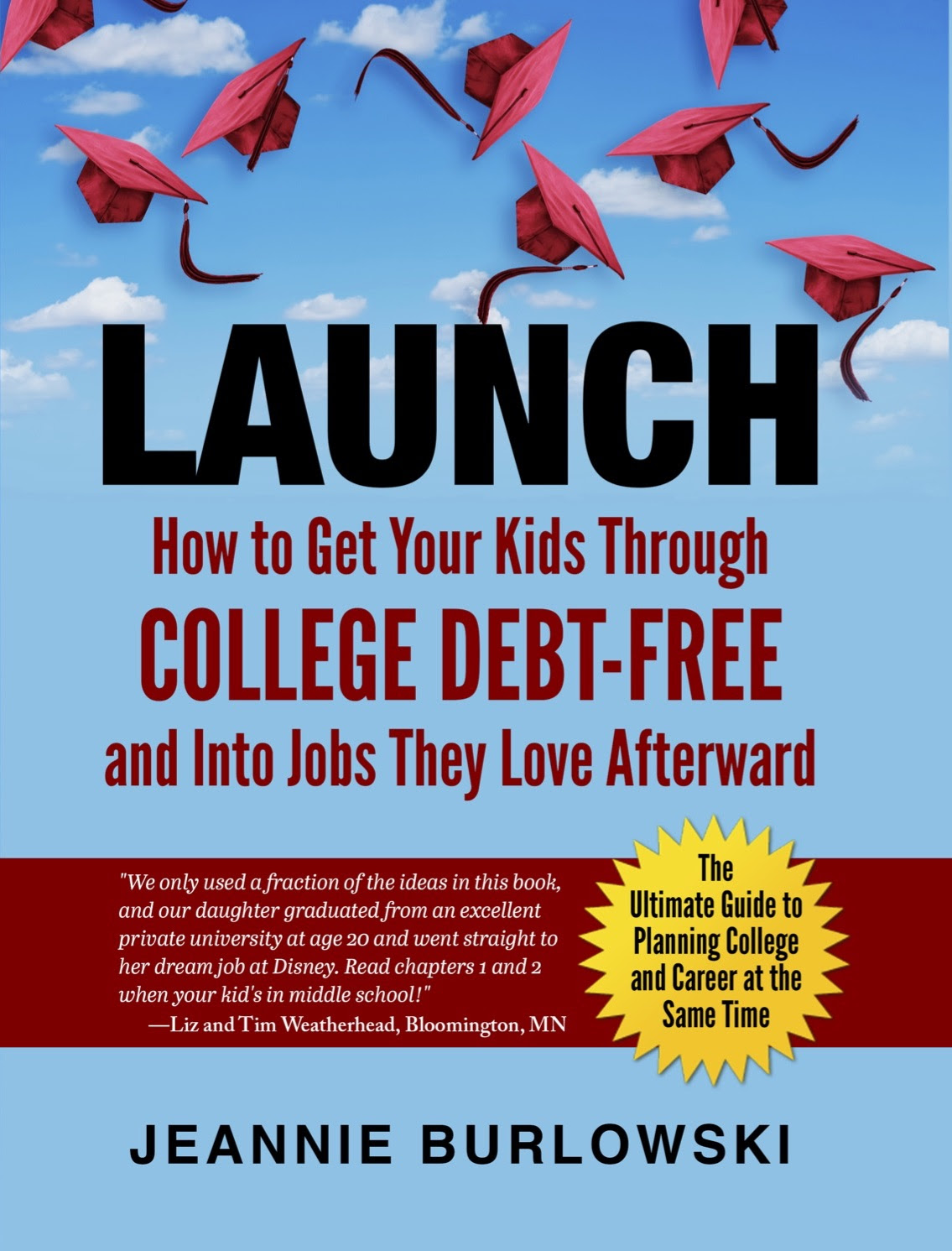Today I’m writing on topic I never, ever thought I would. Could graduating high school with an AA degree in any way do a student more harm than good? My eyes are bugging out just writing that.
Could graduating high school with an AA degree HURT your kid?
For many moms and dads, one of their proudest parenting moments occurs when their 17-year-old walks across the stage at high school graduation with two years of college already completed. An entire two-year AA college degree already sewn up—entirely at state expense. An amazing, stunning achievement! All while dodging the pitfalls of AP classes—and still enjoying a rich, full high school experience.
Parents who get to experience this proud moment get tingly with excitement thinking of their child confidently diving into third year college courses at age 18, finishing college with a bachelor’s degree at age 20, slashing college bills by half, and having extra years of life before age 22 to tour Europe, volunteer, or start piling up real world work experience that rockets their careers far ahead of their peers. (Making them stellar candidates for grad school or medical school, I might add—if that ever becomes a goal.)
Other parents aren’t so sure.
“Might graduating high school with an AA degree keep my child out of the Ivy League?”
The first time I ever heard this, my jaw dropped. But the well-meaning mom persisted. “Might the elite colleges on the east and west coasts sneer at my daughter for having earned an AA degree in high school? I mean, it is 60 college credits—but maybe they wouldn’t like her for doing that. Might she be—stigmatized—for being a part of a program designed for ‘students in the middle’? Might our high-achieving daughter be turned down by every elite college—and end up stuck attending a college close to our home in Minnesota?”
“Don’t worry,” I told her, trying to regain my composure. “I’ve got 4 things that should make you instantly feel better.”
1. Graduating high school with an AA degree can get your kid straight into an Ivy League university.
Forget the soul-crushing admissions pressure that comes with applying to Ivy League universities the usual way. High school grads with AA degrees can glide straight into Ivy League extension schools with zero stress and pressure.
Why? Because these students’ AA degrees qualify them as “adult learners” in a college’s eyes, even though they’re only 18. Typically, extension school students don’t live in university residence halls, but if they get apartments nearby and attend their classes in person, they’ll have every advantage afforded to regular students—while paying a fraction of what other students do. If this interests you, pick an Ivy League university at random, call them, and when they answer say, “Who can give me info on this university’s extension school?”
2. Graduating high school with an AA degree makes your kid a highly desirable college applicant—anywhere.
Every college—elite or not—worries about retention. There’s real worry that the students they enroll might drop out before graduating. This not only damages the college’s return on enrollment investment, it hurts the college’s “4-year graduation rate” on collegedata.com, which makes other parents feel leery about sending their kids there.
Which student do you think is a better bet for retention? The student who took ordinary classes in high school for high school credit only? Or the high-achieving go-getter student who challenged herself with the most strenuous possible course load in high school, proving her abilities with real college-level work over and over again—before she even turned 18?
Even grad schools, medical schools, and PhD programs respect community college classes taken in high school. Quality undergraduate institutions will too.
3. If graduating high school with an AA degree makes your daughter look less desirable to some schools, forget them.
There are plenty of top colleges that will love to have her. Plenty of colleges that will leap at the chance to accept her dual enrollment credits. Plenty of colleges that will extend to her generous merit aid scholarships in hopes of attracting her. Why? Because someone like her will enrich the college campus life for others, and very likely bring honor to the college after she graduates. (For help finding these colleges, carefully read chapter 14 of my book.)
If you’re convinced that there are only three colleges in the United States good enough for your designer offspring, I urge you to read this article on how elite education doesn’t actually make you happier in work or in life, and this article where a Yale professor argues that you should actually talk your kid out of the Ivy League.
4. If graduating high school with an AA degree gets your kid through college faster than you were planning, please relax.
There are a lot of other fascinating things your son can do with the time he’s not grinding away in more college classes. How about completing multiple paid internships? Paid internships are the crown jewel of the high-quality college education. Paid internships will give your son a massive head start on future career life, they’ll skyrocket his confidence, and they’ll build his personal skill set like no college class ever could.
What about freshman financial aid?
This mom also expressed to me worry that her daughter “wouldn’t qualify for freshman financial aid” after graduating high school with an AA degree. My response to her was, “Don’t worry, as long as you fill out the FAFSA form every October even if you’re rich, she’ll get the financial aid she’s eligible for every semester she attends undergrad or grad school.”
When you’re a parent, it feels great to know that you’re taking all the best steps to set your kid up for happy debt-free college and career life.
For clear, step-by-step help getting your kids through college debt-free and into jobs they love afterward, get your copy of my book:
Important—> It’s a reference book, so nobody reads the whole thing cover to cover. Pick out what you need to read in it using the fast-paced, 10-minute video instructions here.
You can see hundreds of reviews of this book on Amazon by going to:
Read just one chapter of LAUNCH every 1–3 months while your child’s in middle school and high school, and you’ll know every viable strategy for debt-free college at exactly the right time to implement it.
And if your child’s already well past middle school? That’s OK; you can run to catch up. But the process of getting your kids through college debt-free goes more smoothly the earlier you start—especially if you’re not planning to save up any money to pay for college.
Let's you and I walk together toward the goal of debt-free college for your kids.
We can accomplish this no matter your current income level—even if your kids never get a single scholarship.
Your first step is getting regularly scheduled, free helpful articles from me—right in your email inbox. Quick, sign up here.
Do you have very specific questions for me about debt-free college and career for your kids?
My TRIBE Members get the most direct access to me—while feeling good that the pennies per day they spend on the TRIBE help me bring debt-free college strategy to families who could never afford to pay for it. Join my TRIBE Membership waiting list here. (The parent testimonials you'll see there are so encouraging!)
Who is Jeannie Burlowski?
Jeannie is a full-time academic strategist, podcast host, and sought-after speaker for students ages 12–26, their parents, and the professionals who serve them. Her writing, speaking, and podcasting help parents set their kids up to graduate college debt-free, ready to jump directly into careers they excel at and love. Her work has been featured in publications such as The Huffington Post, USA Today, Parents Magazine, and US News & World Report, as well as on CBS News.
Jeannie also helps students apply to law, medical, business, and grad school at her website GetIntoMedSchool.com. You can follow her on Bluesky @jburlowski.bsky.social.
No part of this article was written using AI.
This article was updated on September 3rd, 2025.



